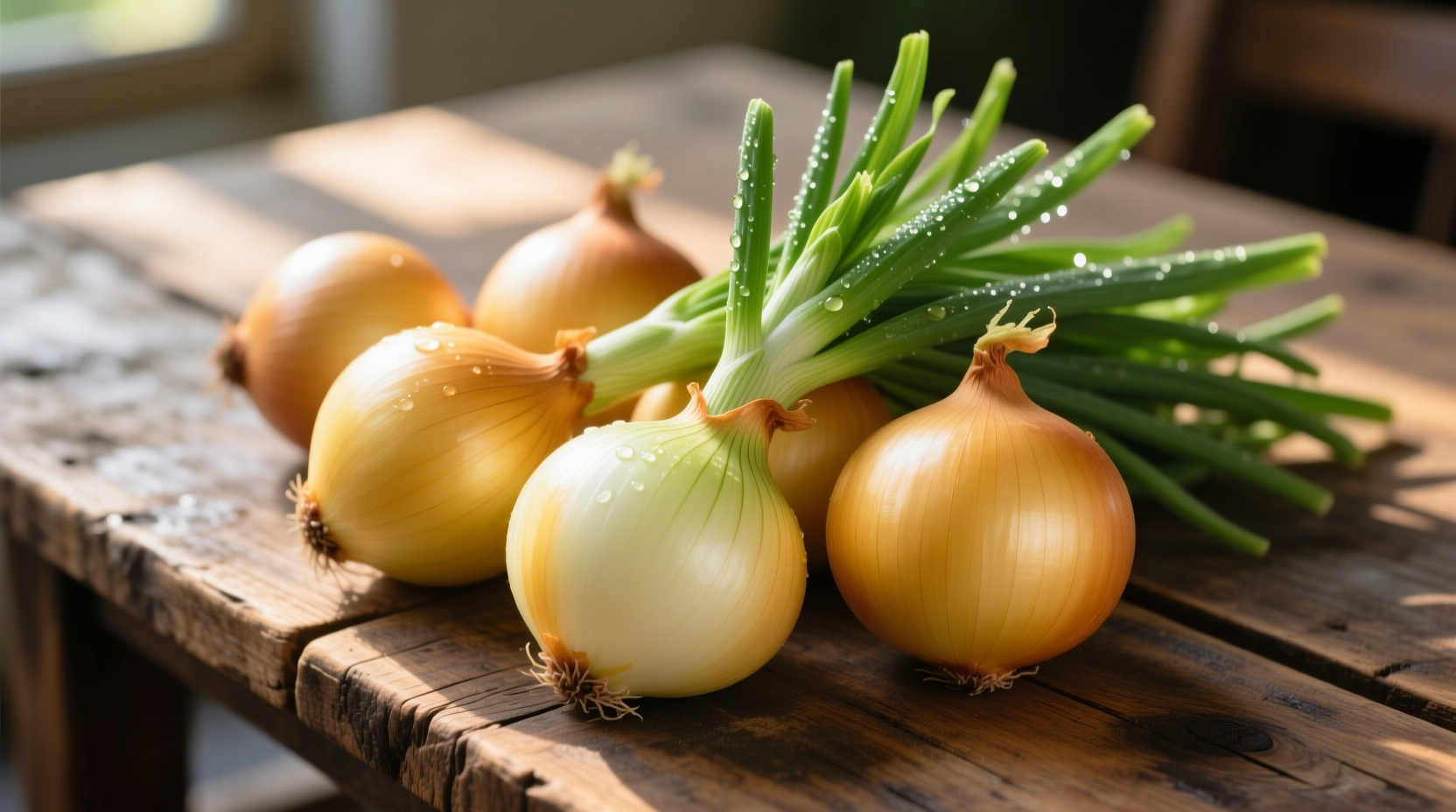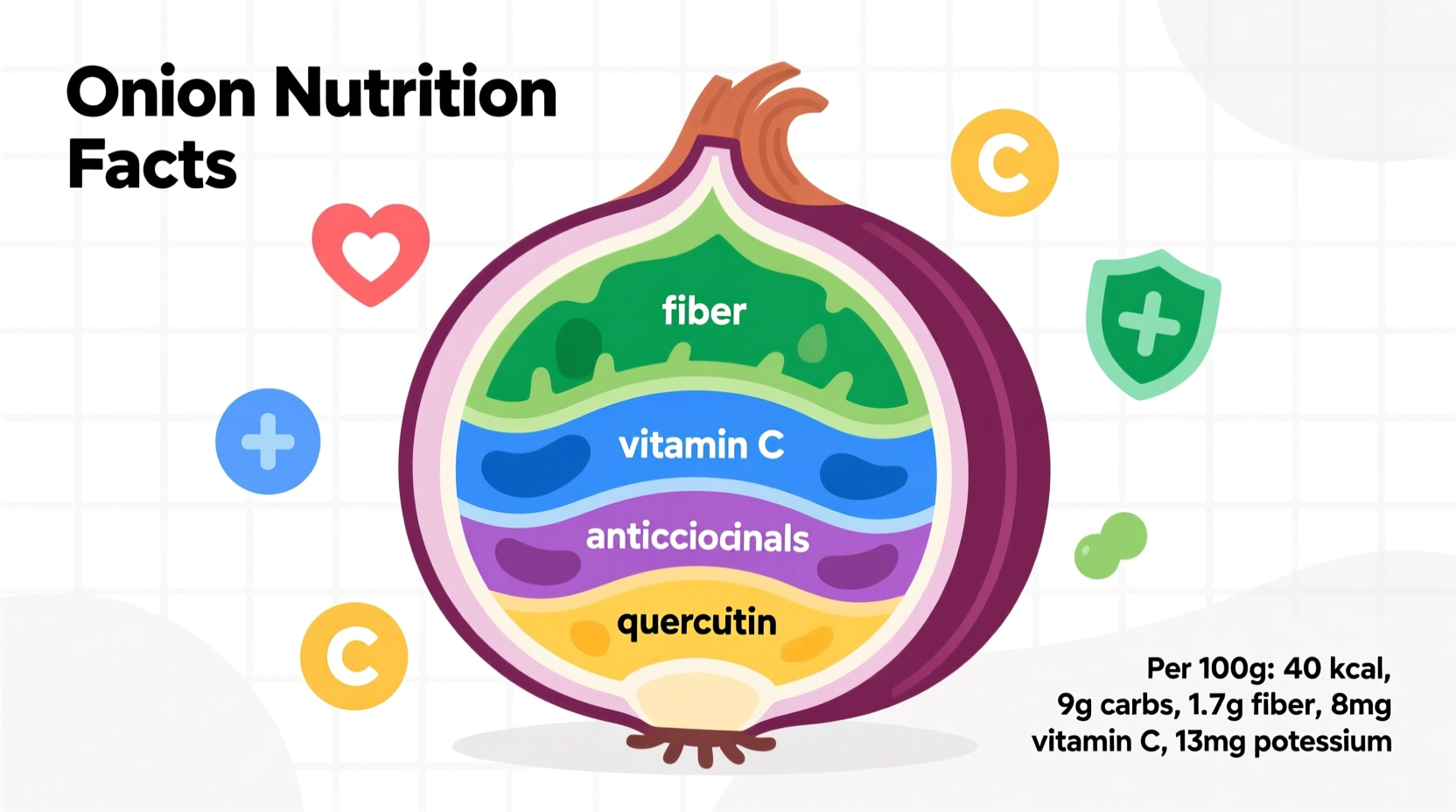One medium onion (110g) delivers just 44 calories while providing 20% of your daily vitamin C needs, 10% of vitamin B6, and powerful antioxidants like quercetin. Onions contain zero fat, offer 1.9g of fiber, and deliver unique sulfur compounds that support heart health and inflammation reduction. This complete nutritional breakdown reveals exactly how onions contribute to a balanced diet.
When you reach for onions in your kitchen, you're grabbing one of nature's most nutritionally versatile vegetables. Beyond their culinary importance, onions pack a surprising nutritional punch that many home cooks overlook. Understanding their precise nutritional composition helps you maximize health benefits while enjoying their distinctive flavor in everyday cooking.
Onion Nutrition Fundamentals: What's Inside Your Bulb
Onions belong to the Allium family, sharing genetic ties with garlic, leeks, and chives. Their nutritional profile remains impressive despite their low-calorie count. A single medium onion (approximately 110 grams) contains:
- 44 calories
- 10.3 grams of carbohydrates
- 1.9 grams of dietary fiber (7% of daily value)
- 1.2 grams of sugar
- 1.2 grams of protein
- Negligible fat content
Unlike many vegetables, onions maintain their nutritional integrity whether consumed raw or cooked, though certain preparation methods enhance specific nutrient availability. The USDA FoodData Central database confirms that onions rank among the top vegetable sources of quercetin, a flavonoid antioxidant with significant health implications.
| Nutrient | Amount per 100g | % Daily Value |
|---|---|---|
| Calories | 40 kcal | 2% |
| Carbohydrates | 9.3g | 3% |
| Dietary Fiber | 1.7g | 6% |
| Vitamin C | 7.4mg | 12% |
| Vitamin B6 | 0.12mg | 7% |
| Folate | 19μg | 5% |
| Potassium | 146mg | 4% |
| Manganese | 0.13mg | 6% |
Key Nutrients and Their Health Impact
Onions deliver several critical nutrients that contribute to overall wellness. Let's examine the most significant components and their proven health effects.
Vitamin C: Beyond Immunity Support
While commonly associated with immune function, vitamin C in onions serves multiple purposes. One medium onion provides approximately 20% of your daily vitamin C requirement. Research from the National Institutes of Health confirms that vitamin C acts as a powerful antioxidant, protecting cells from free radical damage while supporting collagen production for healthy skin and connective tissues. Unlike citrus fruits, onions maintain their vitamin C content during storage, making them a reliable year-round source.
Quercetin: The Onion's Super Antioxidant
Onions rank among the highest dietary sources of quercetin, particularly red onions which contain up to 36.5mg per 100g according to a comprehensive study published in Molecules. This flavonoid demonstrates remarkable anti-inflammatory properties and may help reduce blood pressure. The unique sulfur compounds in onions work synergistically with quercetin, enhancing its bioavailability when consumed as part of whole food rather than supplements.

Practical Nutrition: Maximizing Onion Benefits
Understanding how preparation methods affect nutritional value helps you make informed cooking decisions. Scientific research reveals important context boundaries for onion nutrition:
Raw vs. Cooked: Nutrient Preservation
Raw onions preserve maximum vitamin C content, but cooking enhances certain antioxidants. A study from the Journal of Agricultural and Food Chemistry demonstrated that boiling onions for 10 minutes increased quercetin availability by 25%, while frying reduced it by 10-20%. For optimal nutrition, consider these preparation guidelines:
- Raw applications: Best for preserving vitamin C and enzyme activity
- Light sautéing: Preserves most nutrients while enhancing flavor
- Long cooking: Increases quercetin bioavailability but reduces vitamin C
Varietal Differences in Nutritional Content
Not all onions offer identical nutritional profiles. Research from the USDA Agricultural Research Service shows significant differences between varieties:
- Red onions: Highest in anthocyanins and quercetin (up to 36.5mg/100g)
- Yellow onions: Most commonly used, with balanced nutrient profile
- White onions: Milder flavor, slightly lower antioxidant content
- Shallots: Highest overall antioxidant capacity among onion varieties
Integrating Onions into a Balanced Diet
Onions complement virtually any dietary pattern, from Mediterranean to plant-based eating. Their versatility makes them valuable for multiple nutritional goals:
- Weight management: Low calorie density with high flavor impact
- Heart health: Sulfur compounds may help lower blood pressure
- Digestive wellness: Prebiotic fiber supports beneficial gut bacteria
- Blood sugar control: Chromium content may improve insulin sensitivity
For maximum nutritional benefit, combine onions with healthy fats like olive oil. The fat-soluble antioxidants in onions become more bioavailable when consumed with dietary fats. Try adding sliced raw onions to salads, lightly sautéing them as a base for soups and stews, or roasting whole bulbs to bring out their natural sweetness while preserving nutrients.
Common Misconceptions About Onion Nutrition
Several myths persist about onion nutrition that deserve clarification based on current scientific understanding:
- "Onions cause acid reflux": While onions may trigger symptoms in sensitive individuals, they don't cause acid reflux in most people. The American College of Gastroenterology notes that individual tolerance varies significantly.
- "Cooking destroys all nutrients": As demonstrated by research, certain preparation methods actually enhance specific nutrients while reducing others.
- "Onions have no protein": While not a protein powerhouse, onions do contribute meaningful amounts to plant-based diets when consumed regularly.
Understanding these nuances helps you make informed decisions about incorporating onions into your diet based on your personal health needs and culinary preferences.











 浙公网安备
33010002000092号
浙公网安备
33010002000092号 浙B2-20120091-4
浙B2-20120091-4